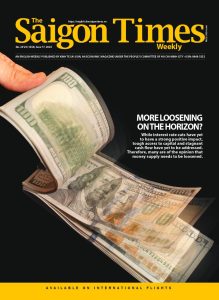Industrial production decline, import-export slump, and negative indicators from the purchasing managers index (PMI) are pointing to a prolonged economic slowdown in the second half of 2023.
Negative signs
A report by the General Statistics Office (GSO) indicates a decline in industrial production, with the index of industrial production (IIP) for the first five months of 2023 dropping two points compared to the same period last year.
The processing and manufacturing sector, which contributes around one-fourth of gross domestic product (GDP), edged down 0.5 point year-on-year in May and 2.5 points year-on-year in the first five months.
In foreign trade, exports in the first five months were estimated at US$136.17 billion, down 11.6% year-on-year, and imports at US$126.37 billion, down 17.9%.
Although there was a trade surplus of nearly US$10 billion, the sharp decline in imports, with over 90% consisting of raw materials and materials for production and business, is a negative sign. It indicates a contraction in the demand for materials, raw material storage, and goods production.
Given the current difficulties, the manufacturing sector’s situation might worsen in the second half of the year, considering the PMI and the employment in the industrial labor force.
The PMI in May was only 45.3, marking the third consecutive month of decline. Moreover, data on labor employment in industrial zones also showed a decline in labor demand. This trend is driven by businesses’ anticipation of fewer orders in the near future.
While the labor employment index of industrial enterprises rose by a slight 0.8% in May, it plunged 4.8% compared to the same period last year. Key economic and industrial drivers across the country also experienced significant year-on-year falls, such as Hanoi (down 4.1%), Bac Ninh (down 12.1%), HCMC (down 3.9%), Binh Duong (down 10.3%), and Dong Nai (down 13.2%).
While the PMI drop indicates businesses’ pessimism about orders in the upcoming months, the labor employment index shows their practical actions to brace for a longer “winter.” The suspension of expansion or labor reduction at this point in time reveals that businesses are preparing for a further drop in orders until the end of this year, and possibly extending into the first half of 2024.
Economic recovery not in sight in H2
At the beginning of this year, businesses were already bracing for a slight economic slowdown and gradual stabilization in the second half of the year. However, given negative developments in leading economies such as the United States, the European Union, and China, it is unlikely that industrial production in Vietnam will pick up in the second half of the year.
In the first half of the year, manufacturing enterprises made preparations despite continued poor economic developments. After experiencing hardships in the final months of 2022, they immediately made adjustments to their production and business plans at the start of this year.

Along with labor reductions at the beginning of the year, enterprises cut output, minimized inventories, optimized operating costs, and increased cash reserves to brace for the worst circumstances. According to several enterprises in HCMC, despite negative economic developments, they have been able to maintain production and business thanks to efforts to downsize the labor force and cut unnecessary operating costs.
Nevertheless, the global economy in the second quarter did not fare as well as expected. The PMI of leading export markets of Vietnam, such as the United States, the European Union, and China, has been below 50 in recent months.
The weak production and consumption demand means there could hardly be a pickup in the demand for imports of goods and services from Vietnam in the second half of the year; thus the domestic industrial production would continue to slump over the rest of the year.
It takes a month before the end of the second quarter as well as the first half of the year. However, given the current signs, producers should map out plans to prepare for a protracted slowdown.









